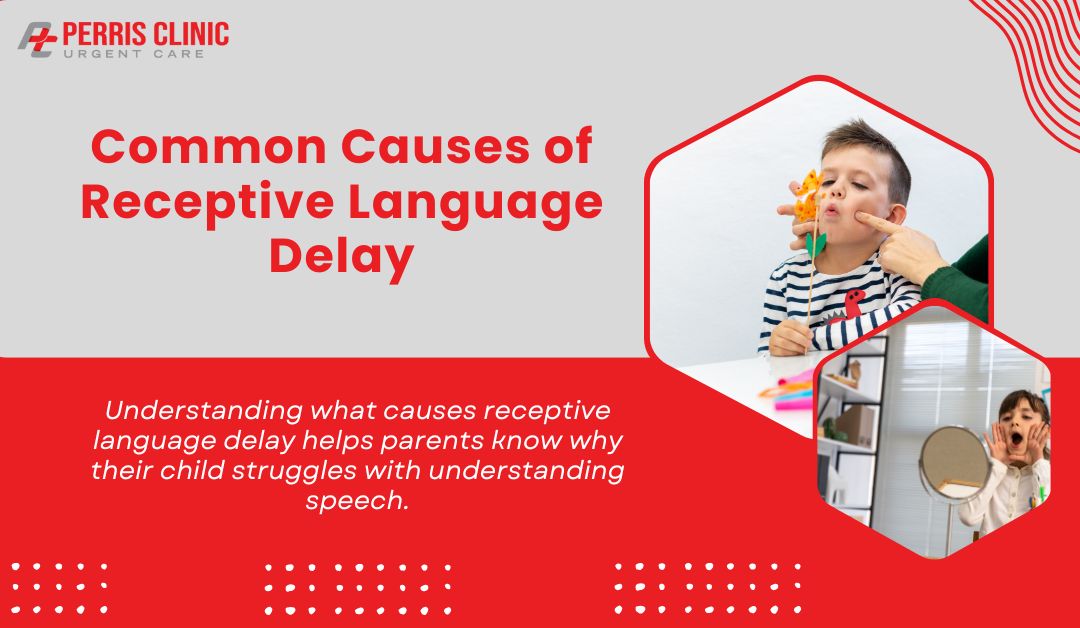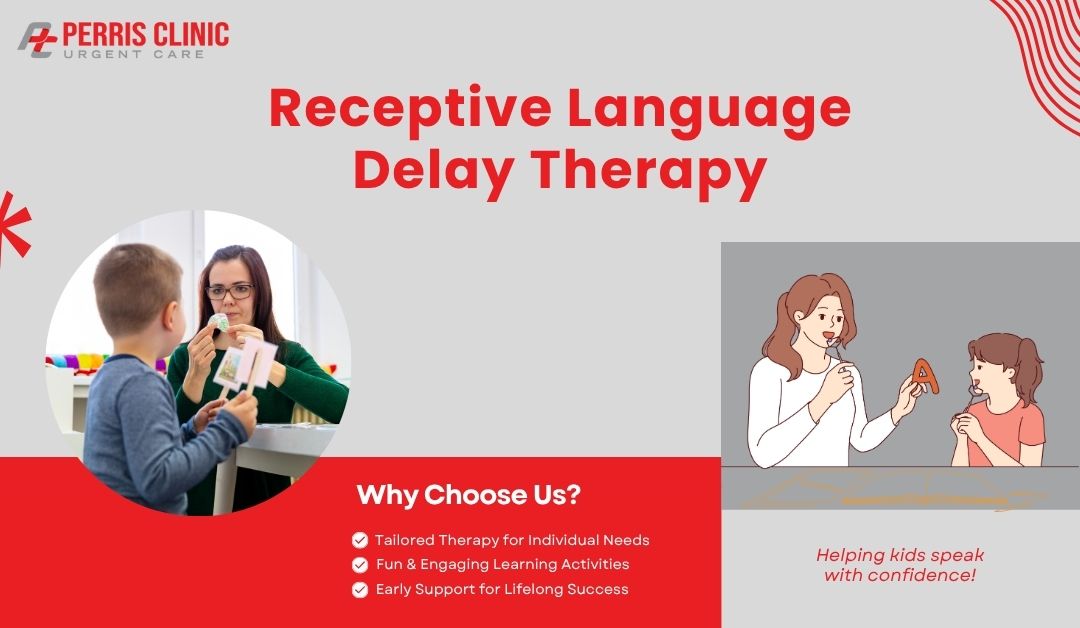Receptive language delay therapy helps children who struggle to understand words or directions. They may not follow simple steps or answer questions. Some may not respond when you call their name. It does not mean they are ignoring you. Their brain needs more time to process words.
This delay can impact play, learning, and social interaction with others. A speech-language pathologist can test for this early. With the right help, many kids improve. Parents can also provide support at home. The earlier you act, the better the results will be. With care and support, your child can grow and develop the ability to enjoy talking with others.
What Is Receptive Language Delay?
Receptive language delay refers to a child’s difficulty in understanding words, instructions, or simple cues. This makes it hard for them to follow what people say around them. Kids with this delay process language more slowly than other children their age.
How Receptive Language Delay Works
Receptive language delay affects how a child takes in and understands spoken language. It differs from expressive language delay, which concerns a child’s ability to use words or communicate effectively. A child with a receptive language delay may hear words but struggle to understand them quickly. This delay can make it hard to follow directions or answer questions.
When Do Parents Notice It?
Most parents begin to notice signs in early toddler years, usually between 1 and 3 years old. A child may not respond when someone calls their name or may seem confused by simple instructions. Sometimes, they may avoid eye contact or refrain from using gestures like pointing or waving. These are clues that a child might have trouble with language comprehension.
Why It Matters
When children don’t understand what others say, they can get frustrated. This can affect their play, learning, and social skills. Without help, the gap between their language skills and those of their peers may widen. That’s why early screening and support are essential. Speech therapy can help children catch up and build stronger language skills over time.
Signs and Symptoms in Children
Children with receptive language delay show clear signs that parents and caregivers can notice. These signs help find out if a child needs support early on.
Common Signs to Watch For
Some children don’t respond when someone calls their name. They might seem like they are not listening. At other times, they struggle to follow simple directions, such as “come here” or “put your shoes on.” Children with receptive language delay may also struggle to understand simple questions.
How Behavior May Show
Because they don’t understand well, some children get frustrated. They might act out or avoid talking. Others use fewer gestures or facial expressions. They might seem quiet or withdrawn. Sometimes, children miss the meaning behind the tone of voice or body language, which can make social interaction harder.
When to Be Concerned
If a child is slow to respond or does not follow simple instructions by age 2 or 3, parents should take notice. Not responding to their name or ignoring questions can also be signs. These problems may point to a receptive language disorder or delay.
Common Causes of Receptive Language Delay
Understanding what causes receptive language delay helps parents know why their child struggles with understanding speech. Several factors can influence language development.

Developmental Disorders
Some children have conditions like autism or ADHD. These can slow down their ability to process language. Kids with these disorders might find it hard to follow directions or understand questions.
Hearing Problems
Hearing loss or ear infections can make it difficult for a child to understand words. If a child can’t hear well, they may not learn language as quickly as others. This can cause delays in understanding spoken language.
Brain Injury or Trauma
In rare cases, a brain injury or damage can affect the parts of the brain that help process language. This may lead to problems with receptive language.
Limited Language Exposure
Children who don’t hear enough words at home or in their environment may have delayed language skills. Talking, reading, and playing with a child often help build their understanding.
Genetic or Neurological Conditions
Sometimes, language delay occurs due to inherited traits or neurological issues. These affect how the brain develops and processes speech.
How Receptive Language Delay Affects Daily Life
Receptive language delay can make daily activities harder for children. When children struggle to understand words and instructions, it can impact many aspects of their lives.
Challenges at School
Children may struggle to follow teachers’ instructions. This can make learning new things more difficult. They might fall behind in class because they don’t catch what is being said.
Social Interaction Problems
When children struggle to understand others, they may have difficulty forming friendships. They may miss social cues, like tone of voice or body language. This can make playing and talking with other kids hard.
Behavioral Frustrations
Not understanding what others say can lead to frustration. Children might act out, get upset, or become shy. These behaviors happen because they feel confused or overwhelmed.
Communication Gaps with Parents
Parents may find it harder to connect with their child. Misunderstandings can cause stress for both. Children may not respond as expected, making daily routines a challenge.
How Speech Therapists Diagnose It
Determining if a child has a receptive language delay begins with thorough assessments by healthcare professionals. Early diagnosis enables the receipt of proper support more quickly.
Pediatrician Evaluation
A child’s doctor watches how they understand and use language during regular checkups. If the doctor notices delays, they might suggest more tests.
Speech-Language Pathologist Assessment
A speech-language pathologist (SLP) tests the child’s ability to understand words and follow directions. They use simple games and activities to see how well the child processes language.
Hearing Test
Hearing problems can cause language delays. Doctors often test a child’s hearing to rule out any issues that might affect understanding.
Developmental Screening
Experts also examine how the child develops in other areas, such as motor skills and social behavior. This helps identify if other delays or disorders are present.
Effective Therapy Options That Help
Speech therapy helps children with receptive language delay improve their understanding. Different methods and activities work together to support each child’s needs.
One-on-One Speech Therapy
A speech-language pathologist works closely with the child. They use games and activities that focus on understanding words and following directions. This personalized help lets the child learn at their own pace.
Read this to learn how occupational therapy helps people with OCD manage daily tasks, reduce stress, and build better routines for a more balanced life.
Play-Based Therapy
Therapists use play to teach language skills. Playing makes learning fun and helps children stay engaged. It also helps them practice understanding in real-life situations.
Parent-Led Home Strategies
Parents learn simple ways to support their child at home. This includes using clear words, repeating instructions, and reading together. These practices help strengthen language skills between therapy sessions.
Please read this to learn about the role of an occupational therapist in supporting children, including their assistance with daily tasks, motor skills, learning, and independence.
Visual Aids and Tools
Pictures, flashcards, and gestures help children better understand language. These tools make words easier to follow and remember.
Early Intervention Programs
Starting therapy early can make a big difference. Early intervention programs offer extra support during the critical years of language development.
Home Activities to Support Your Child
Parents can play a significant role in helping their child with a receptive language delay. Simple activities at home boost understanding and build language skills.
Read Together Daily
Reading short, simple books every day helps children hear words and learn their meaning. Talking about pictures makes the story easier to understand.
Use Clear Instructions
Provide one-step directions and use gestures to illustrate your point. For example, say “pick up the ball” while pointing to it.
Name Everyday Objects
Discuss things around the house frequently. Say the names of toys, clothes, or food as you use them. This helps children connect words to objects.
Play Interactive Games
Games like “Simon Says” teach children to listen carefully and follow instructions. These games make learning fun and improve comprehension.
Use Pictures and Flashcards
Showing pictures while saying words helps children link images with language. This makes understanding easier and faster.
When Should You Seek Help?
Knowing when to get help is essential for children with receptive language delay. Early support can have a profound impact on a child’s learning and development.
Signs That Mean It’s Time to Act
If your child is slow to respond to simple words or questions by 18 months, it is essential to monitor their development closely. Not following directions or not answering when called by name can be signs of delay. If they avoid eye contact or don’t use gestures like pointing, it may also mean they need help.
Why Early Help Matters
Children learn language best when they get support early. The sooner a speech-language pathologist starts therapy, the better your child’s chances of catching up. Early intervention helps children build stronger language skills and reduces frustration in daily life.
How to Get Help
Start by talking to your child’s pediatrician. They can check your child’s development and refer you to a speech-language pathologist. The specialist will conduct tests and create a personalized therapy plan tailored to your child’s needs.
Why Families Trust Perris Clinic
Perris Clinic helps many families with receptive language delay. Our speech therapists have experience working with children of all ages. We create therapy plans tailored to each child’s individual needs.
Our team works closely with parents, teaching them how to support language growth at home. We offer a friendly and caring space where kids feel at home. Families in Perris count on us for expert care and quick support.
Final Thoughts
Receptive language delay can slow a child’s ability to understand words and directions. However, with early intervention and sound therapy, children can make significant improvements.
Watching for signs and acting quickly helps your child grow stronger language skills. At Perris Clinic, we want every child to feel confident and prepared to communicate effectively. If you have concerns, don’t wait, reach out and get the support your child deserves.
FAQs About Receptive Language Delay Therapy
What is a receptive language delay?
Receptive language delay refers to a child’s difficulty in understanding words, questions, or instructions. It affects how they process spoken language.
How do I know if my child has a receptive language delay?
Look for signs such as not responding to their name, not following simple directions, or appearing confused by questions. These often show up between the ages of 1 and 3.
Can speech therapy help with receptive language delay?
Yes. Speech therapy helps children improve their understanding of language through games, activities, and clear instructions. Early treatment works best.
What causes receptive language delay?
Hearing problems, developmental disorders like autism, brain injury, limited language exposure, or genetic conditions can cause it.
When should I get help for my child?
If your child doesn’t respond to simple instructions or questions by 18 months to 2 years, talk to a pediatrician or speech therapist as soon as possible.


Trackbacks/Pingbacks